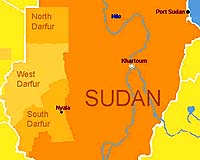| . |  |
. |
Washington (UPI) Oct 23, 2009 The United States needs to do more to counter bioterrorism threats to its own interests and international security, says a report from the bipartisan Commission on the Prevention of Weapons of Mass Destruction Proliferation and Terrorism. The commission's interim report lauded President Barack Obama's response so far to the dangers posed by weapons of mass destruction, including nuclear weapons, but said more needs to be done by the administration to counter problems posed by biochemical weapons. "The clock is ticking," said the commission's chairman, former Sen. Bob Graham of Florida. "The United States has taken action, but we have not kept pace with those who would do us, or the world community, harm. The terrorists are flexible and increasingly capable. The executive branch, the legislative branch, and even the American people must do more." "The biological threat is often misunderstood," added the commission's vice chairman, former Sen. Jim Talent of Missouri. "But the fact is, it is only getting easier and cheaper to develop and use biological weapons -- and our best response is to mitigate the effects through faster, safer vaccines and therapeutics. It's essential that the U.S. government move more aggressively on this front." The commission, mandated by Congress, grew out of the Sept. 11 Commission, which was a response to the Sept. 11, 2001, attacks on the United States. Charles Rault, director of ISRI.com geopolitical and diplomatic intelligence consultancy, told United Press International in an interview, "The fight against biochemical weapons lacks a real leadership, an appropriate funding and a sincere oversight on the part of the international community." He said this contrasted with the nuclear weapons scenario where much of the international campaign against non-proliferation is waged openly, even though without much success. Also, unlike the nuclear scene, he said, it's hard to ascertain the quantities or locations of biochemical weapon stockpiles among countries that are hostile to the West or suspected of direct links with international terrorism. The commission's report called bioterrorism the "most urgent threat" facing the United States and cited "missteps" that fell short of securing adequate funding for anti-bioterrorism programs and "appropriate disease surveillance." The commission has argued that bioterrorism is a much more serious threat than nuclear weapons because it is easier and cheaper to launch on unsuspecting societies. Its campaign has already led to tighter security at laboratories that work with dangerous pathogens. Rault said bioterrorism poses a threat not only to the United States but to the world community. The European response, including an action plan likely to cost more than $160 million between 2010 and 2014, indicates the threat of chemical, nuclear or biological terrorism is taken seriously by EU governments. However, Rault said, bioterrorism was not easy to mount and involved complex processes dangerous to any terrorists themselves. Biochemical weapons are easier, cheaper and faster only when compared to nuclear weapons but so far represent a very small fraction of overall terrorist activity since Sept. 11. In contrast, fatalities from improvised explosive devices have been many, Rault said. He indicated that U.S. preparedness in the face of bioterrorism threats was complicated by contrasting scenarios at federal and local levels. While the federal law enforcement agencies seem ready to deal with the threat, local authorities are not yet equipped to differentiate between incidents caused by suspected terrorism and accidents. He cited a U.S. Government Accountability Office report in 2008 that local law enforcement agencies "still do not have tools to accurately identify right away what, where and how much chemical, biological, radiological, or nuclear (CBRN) materials are released in U.S. urban areas, accidentally or by terrorists." Share This Article With Planet Earth
Related Links The Long War - Doctrine and Application
 U.S. again seeks Sudan's help
U.S. again seeks Sudan's help Khartoum, Sudan (UPI) Oct 21, 2009 U.S. President Barack Obama's White House is finding, as did the Bill Clinton and George W. Bush administrations, that it needs the troublesome Islamist regime in Sudan to help in the war against al-Qaida. On Monday, the White House disclosed that it will renew sanctions on Khartoum over the conflict in Sudan's Darfur region but will seek to persuade the government of President Omar ... read more |
|
| The content herein, unless otherwise known to be public domain, are Copyright 1995-2009 - SpaceDaily. AFP and UPI Wire Stories are copyright Agence France-Presse and United Press International. ESA Portal Reports are copyright European Space Agency. All NASA sourced material is public domain. Additional copyrights may apply in whole or part to other bona fide parties. Advertising does not imply endorsement,agreement or approval of any opinions, statements or information provided by SpaceDaily on any Web page published or hosted by SpaceDaily. Privacy Statement |